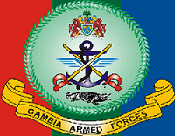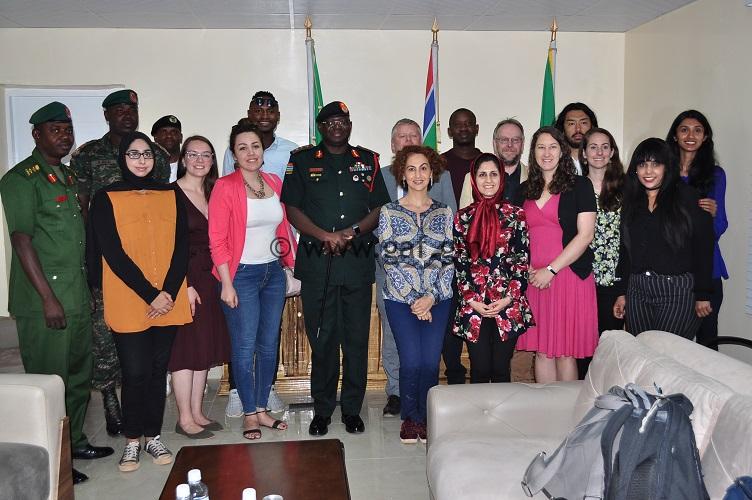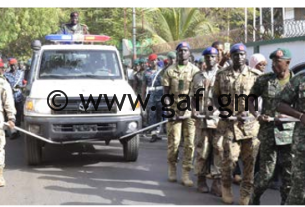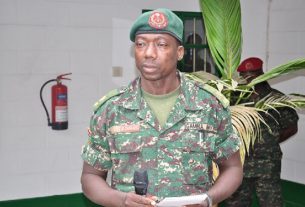The Team was led by Dr. David Harris, Director of John & Elnora Ferguson Centre for African Studies, University of Bradford; the Coordinator of the Africa Study Tour, Melody Musser and students from the University of Bradford on 21 February 2019.
After welcoming the students, the CDS gave a brief background to his visitors. “Your request to hear from me about security situation of the Gambia with specific areas of interest such as the resolution of the crisis in the aftermath of December 2016 political impasse, the role of the ECOWAS Mission in Gambia (ECOMIG) and the Security Sector Reform in the Gambia is highly welcomed. Most heartwarming is your choice of The Gambia irrespective of our small size as your study tour destination, is indeed a source of pride for the country in general and the Armed Forces in particular,” he remarked.
He went on to give the following description “…as a student of peace study; it is undeniable fact that there can be no meaningful development without peace and security. Having gone through some form of political upheaval, it is my conviction that your coming to the Gambia at this juncture would broaden your understanding of the complexities in peace building and post-crisis reconstruction in Africa by learning from our experiences,” he intimated the gathering.
The interactions were centered on three earlier mentioned areas of interest as regards to the tour as follows:
“RESOLUTION OF THE POLITICAL CRISIS
As you are all aware, The Gambian Nation was faced with a political impasse of unprecedented proportion when Gambians went to the polls to elect a new President on 01 December 2016, in accordance with Gambian constitution. The election was described as free and fair by Election Observers and the wider International Community. The following significant events unfolded:
a. On 2 December 2016, the Independent Electoral Commission (IEC) declared the current President Mr. Adama Barrow as duly elected. The Chairman of the IEC informed the public that Ex President jammeh was ready to concede defeat. The incumbent Jammeh conceded defeat and said that he would not challenge the outcome of the elections. His acceptance though held historic was surprising not only to the Gambian people but the International community as well. Celebrations erupted across the country.
b. On 09 December 2016, President Jammeh in a surprise move reversed his decision. He stated that he no longer accepted the election results, declared it as null and void citing electoral abnormalities. The next day, he filed a petition with the Supreme Court in an attempt to overturn the result, triggering worldwide condemnation. However, there was no seating Supreme Court at that time. His attempt to constitute one failed.
c. On 10 December 2016, Senegal was the first to express dismay at Jammeh’s declaration and called for diplomatic intervention.
d. On 13 december 2016, the Nigerian President Muhammadu Buhari, Liberian President Ellen Johnson, Sierra Leone President Ernest Bai Koroma and Ghanaian President John Mahama visited The Gambia as a delegation of ECOWAS regional bloc to urge Jammeh to accept the verdict of the people, but he refused.
e. On 17 December 2016, ECOWAS leaders met in Abuja and resolved to stand by the poll results, grant President-elect Barrow protection and attend his inauguration scheduled for January 19, 2017. The AU and UN lauded ECOWAS for its firm stand on Gambia.
f. On 20 December, 11 Gambian Ambassadors asked Jammeh to step down. This was in addition to calls by the Gambia Bar associations and Civil societies for him to step down.
g. On 13 January 2017, the ECOWAS mediation team made a second unsuccessful visit to persuade Jammeh to leave peacefully. The AU also sent a message urging Jammeh to step down, warning it will not recognize him as Head of State by 19 January 2017. Having sensed the insecurity in the country, the mediation team left together with President-elect Barrow for Mali to join other African Leaders at an ongoing France-Africa summit which was discussing security issues in West Africa.
h. On 15 January 2017, President-elect Barrow left Mali to go to Senegal based on the outcome of the mediation team’s decision and recommendation for his safety, where he was to stay until his inauguration on 19 January 2017.
i. On 16 January 2017, the Chief Justice of the Gambia, excused himself from hearing Jammeh’s case citing potential conflict of interest as he was named a party to the case. This dealt a big blow to Jammeh’s attempt to stop Barrow’s inauguration.
j. On 17 January 2017, Jammeh declared a state of emergency saying that foreign powers had created an unwarranted hostile atmosphere, threatening the sovereignty, peace, security and stability of the country.
k. On 18 January 2017, Senegal announced that its army was ready to intervene in The Gambia if there was no solution to the crisis by Jan 19.
l. On 19 Jan 17, President-elect Barrow was inaugurated at The Gambian Embassy in Dakar, Senegal.
m. Increased domestic and international political pressure compounded by the threat of military action by an Economic Community of West African States (ECOWAS) finally prompted Ex President Jammeh to leave the country on 22nd January 2017. This paved the way for the return of President Barrow from Senegal to the Gambia on 26 January 2017.
n. The outcome of the political impasse was serious politic that it almost plunged the country closer to a conflict. It is important to point out that the whole process was guided by the due respect to the constitutional and Regional and International Mechanisms.
THE ROLE OF ECOWAS MISSION IN THE GAMBIA
The intervention of ECOWAS in the Gambia was premised on the fact that the situation in The Gambia was an African problem that needed an African solution. A draft resolution was presented by Senegal (Non-Permanent Member) to the United Nations Security Council (UNSC) to support ECOWAS effort in forcing former President Jammeh to step down. He went on to state that “this action was done in the context and spirit of the ECOWAS protocol on Democracy and Good Governance relating to the Mechanism for conflict Prevention, management, Resolution, Peacekeeping and Security. The draft resolution was eventually adopted by the UNSC and hence the deployment of the ECOWAS Mission in The Gambia (ECOMIG) as authorised by ECOWAS member States.”
ECOMIG mandate include the provision of close protection to the president and the members of the government, as well as key locations such as the international airport and waterway terminals. They also conduct confidence building joint patrols with Gambian Armed Forces.
SECURITY SECTOR REFORM
The Gambia went through 22 years of dictatorship and authoritarian rule during which there was direct interference of the executive with the security sector thus undermined professionalism, operational effectiveness and accountability. Instead of using the security services for human security, it was mainly used for the wrong reasons to achieve regime security. This has undoubtedly left the security sector in distress with deteriorating public confidence.
Security Sector Reform (SSR) has generally been one of the most urgent things undertaken by countries emerging from conflicts and political transition. Usually a successful SSR would involve the restructuring of the armed and security services, formulation of new and/or revised security policy and doctrine.
Our SSR programme is part of the wider Government reform Agenda geared towards creating an armed forces that is accountable, professional, sensitive to the needs of the people and subservient to the civil authority. The primary role of the Security Sector reform is the conceptualization of security and a change in the manner in which the role of the state security is envisaged.
As a starting point of the Security Sector Reform process there was the need to make a serious reassessment of security challenges, articulate security policies to address them and a road map that will repositions the security services to implement them. This is based on the fact that an effective SSR should stem from a holistic view of security, based on a comprehensive approach which identifies all security challenges and ensures both institutional coherence and operational complementarities between security actors. As a coordinated series of actions designed to improve efficiency and effectiveness of the armed forces, the following has been critical:
a. Reviewing the roles and objective of the Armed and security
services.
b. Reconsidering the relationship between the defence sector and other security services as well as the institutions involved in managing and overseeing the defence sector.
c. Developing appropriate action plans, priorities and reform programmes.
d. Implementing the reform within a framework that allows for monitoring and adaption.
Objective
The main objective of any SSR process is to ensure that the armed forces is effectively overseen and under a democratic controlled so as to support governments of transitional countries such as ours in fulfilling their legitimate security functions through reforms. This is being achieved by:
a. The creation of a Directorate of Inspection such as the IG GAF.
b. Reforms within the military chain of command for discipline and regimentation.
c. Enhancing constitutional control and measures to strengthen the ability of the civil society to monitor the military and support defence education.
d. Capacity building to enhance competence and professionalism.
Key Actors
In our SSR programme, the following actors play key roles:
a. The National Security Council.
b. The National Assembly Standing Committee on Defence and Security.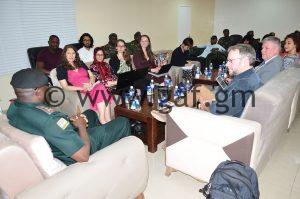
c. Office of the National Security Advisor.
d. The Armed Forces.
e. The Committee on National Defence and security Policy.
f. Sister security services such as the Police, Intelligence, immigrations,
and customs and so on.
Distinguished ladies and gentlemen, at this juncture I open the floor for discussion. But before that, it is my hope that the various interactions you had including this one would strengthen your classroom knowledge. Additionally, its hope that by the time you return, your skills would be enhanced to develop your career not as fighters but as peace makers,” he concluded.
